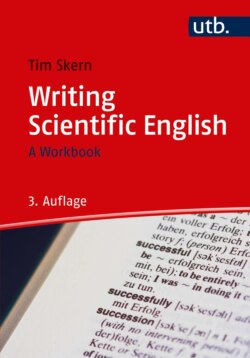Читать книгу Writing Scientific English - Timothy Skern - Страница 5
Preface
ОглавлениеIn 1992, I started to teach “Writing and Speaking Scientific English” at the University of Vienna. My qualifications included English as a native tongue as well as experience of writing my own scientific manuscripts and correcting those of others. I had also given some scientific talks and listened to considerably more. That was all. I was ignorant about how to begin teaching scientific English. I had no idea about the specific problems faced by the students, whether I should take their scientific and cultural backgrounds into account or how I should go about improving their standard. Somehow, the students and I survived and profited from the first course. During that first course and later in subsequent ones, I came to recognise that the students, independent of their various scientific and cultural backgrounds, shared many common problems in writing scientific English. To address these problems, I developed a series of guidelines and exercises to turn, as rapidly as possible, the students' school English into the formal English required for scientific texts. These guidelines and exercises, modified over the years to incorporate ideas on avoiding plagiarism, form the first part of this workbook.
The second part of this book uses work from former students to illustrate how to improve the first draft of a scientific text. This skill, essential to scientific writing, is one that almost every student who has taken the course needed to reflect on and to practise. I know from my own experience how difficult it is to improve a text written in a language other than one's native tongue. I hope that the exercises will be an asset to the reader in becoming proficient in improving scientific texts in English.
I would like to take this opportunity to thank all of the students, colleagues, friends and family members without whose support both course and workbook would not have seen the light of day. A very special thank-you goes to the 21 students who responded so quickly and positively to my request to be able to use their work. Their texts add an unconventional feature to the book. Without them, this would be just another book on writing scientific English. Special mention also goes to my colleagues Rainer Prohaska, who first suggested that I teach a course on scientific English, and Hannes Klump, who suggested writing a workbook.
I would like to express my gratitude to Tanja Kostic", Brooke Morriswood and Petra Schlick whose efforts greatly enhanced the quality and scope of the book. Tanja typed in the work of the former students and was instrumental in finding a way to show how the texts had been improved. She also made a significant contribution to the content and appearance of the model manuscript in chapter 4. Brooke did his best to make me kick the professorial habit of preaching and ensured that I remained steadfast in omitting needless words. Petra very carefully proofread the exercises and their improvements and put forward other numerous suggestions to strengthen the book. All three corrected innumerable errors and blunders. Those that remain are entirely my responsibility.
I also would like to specifically thank the following for their important contributions to the book: Martin Breuss, Susanne Dormayer, Maria Kalyna, Martina Kurz, Sergei Lapato, Julia Leodolter, Zdravko Lorkovic, Christiane Mair, Elisabeth Malle, Evelyn Missbach, Anna Mitterer, Angelika Mühlebner, David Neubauer, Sanda Pasc, Marianne Popp, Lucia T. Riedmann, Betty Skern, Marina Skern, Margarita Smidt, Lena Sokol, Jutta Steinberger, Friederike Turnowsky, Graham Warren, Philippa Warren, Junping Zhu and Melanie Zwirn.
Christian Kaier of Facultas AG efficiently shepherded the book through the production stages. Michael Karner performed wonders with the layout and remained commendably patient with my sometimes impossible requests. Robert Chionis not only carefully proofread the manuscript but also contributed to the clarity of the book and eliminated numerous Germanisms. I am grateful to all of you.
The idea for the content of the model manuscript was conceived during various visits to Cape Town. In return for this inspiration, all of my proceeds from this book will go to support Monwabisi Magoqi, a teacher on HIV and counsellor to AIDS patients in Khayelitsha near Cape Town. Supporting Monwa is a more effective way of fighting AIDS than any research I might ever do.
Tim Skern, Cape Town, August 2008
